Last Sunday’s election of far-right candidate Jair Bolsonaro as president of Brazil will likely prove a major break with the country’s traditional approach to foreign policy. In recent decades, Brazil has sought to influence the international order by relying heavily on “soft power”—the ability to persuade others to align with its diplomatic proposals because of the underlying appeal of Brazil’s domestic model and its peaceful approach to resolving international disputes.
Under former President Lula da Silva (2003-2011), Brazil’s soft power reached its peak. Brazil portrayed itself internationally as a successful, inclusive, multi-ethnic democracy, showcasing years of above-average economic growth, an expanded middle class, and greatly reduced poverty rates. It translated this into greater influence, on occasion, in the global institutions underpinning the liberal international order.
Since 2014, Brazil’s soft power has steadily eroded, beginning with a major economic crisis, a massive corruption scandal that led to the jailing of former president Lula and major business figures, and the impeachment of President Dilma Rousseff in 2016.
However, the election of Jair Bolsonaro, a long-serving right wing legislator with authoritarian tendencies, will likely put paid to what remains of Brazil’s soft power abroad. First, the highly polarizing vision of Brazil that President-elect Bolsonaro has set forward is unlikely to appeal to many abroad, nor will it provide new reasons for diplomatic partners to align with Brazil. Second, his attack on Brazil’s traditional diplomatic policies reflects a lack of support for the present international order, one that for all its flaws, Brazil has relied on to extend its influence and protect its interests. And finally, his desire to align with President Trump’s foreign policy means betting all of Brazil’s chips on a fickle U.S. president and a Washington foreign policy establishment that has traditionally cared little for Brazil or its interests.
A break with the past
Bolsonaro won the 2018 Brazilian presidential election by running against the Brazilian Workers’ Party, which many Brazilians blame for the erosion of the middle class and deteriorating public safety. Many Brazilians are desperate for a change, and Bolsonaro capitalized on this by portraying his Workers’ Party opponent, Fernando Haddad, as a man who would take Brazil down the path of Venezuela, a neighboring left-wing dictatorship now known for its spectacular economic implosion and rising tide of economic refugees. Bolsonaro’s highly polarizing extremist views on women and minorities, his attacks on the media and his opponents as “red bandits,” and his “no quarter” policy justifying extrajudicial killings by police proved to be popular with men and with the growing number of evangelicals in Brazilian society, providing him with a solid second-round election victory on October 28.
Bolsonaro’s views are likely to be popular with right-wing populist governments around the world—recalling Philippines President Duterte’s crime policies and President Trump’s attacks on the media and the opposition—but more explicitly colored with racism, sexism, and homophobia. While such policies may appeal to his base at home, if international reactions to Duterte and Trump are any guide, Bolsonaro’s domestic policies are unlikely to provide a platform for expanding Brazil’s soft power more broadly.
Nor does Bolsonaro appear to think much of traditional Brazilian approaches to diplomacy. Bolsonaro has vowed to revise Mercosur, Brazil’s longstanding regional integration project. Desiring to increase agribusiness opportunities in the Amazon, he has threatened to pull out the Paris climate change agreement (later recanted, at least temporarily). He has vowed to move the Brazilian embassy in Israel to Jerusalem, much as President Trump did, overturning Brazil’s longstanding support for a two-state solution. Bolsonaro has been highly critical of China, which is Brazil’s largest trading partner, to the alarm of Brazilian business leaders and the Chinese government.
President-elect Bolsonaro and his team have frequently expressed their admiration for President Trump, and they have vowed to align Brazil’s diplomacy closely with that of the United States. The front-runner to serve as Bolsonaro’s foreign minister, Brazilian diplomat Ernesto Fraga Araújo, has written a sympathetic journal article about Trump, portraying the U.S. president’s foreign policy as an effort to combat globalists and save the Christian West from radical Islam and global cultural Marxism. His views apparently align closely with those of Bolsonaro’s foreign policy team.
Observers have argued that the closest historical analogy to Bolsonaro’s approach to the Trump administration is Argentina’s policy of “carnal relations” with the United States under President Carlos Menem in the 1990s, although the values that underpinned the U.S.-Argentina relationship—a shared interest in democracy, human rights, peacekeeping, and multilateralism—were quite different. It also recalls the pro-U.S. foreign policy of Brazil’s first military president after the 1964 coup d’état, General Castelo Branco. President Trump and Bolsonaro have already expressed their mutual admiration, and Bolsonaro’s foreign policy team may attempt to pursue a strategy of flattering President Trump to secure his support internationally, as other foreign leaders have done. This may have its earliest impact on Brazilian foreign policy in the case of Venezuela, with the United States and Bolsonaro backing stronger action than Brazil had previously been willing to pursue.
However pro-U.S. Bolsonaro becomes, Brazil would do well to recall the fate of Argentina in 2001, where after years of pro-U.S. “automatic alignment” in foreign policy, Argentina was nevertheless left to its fate by the George W. Bush administration, largely for ideological reasons, when the 2001 financial crisis struck. Brazil may be the fifth-largest country in the world, but South America never ranks very high on the agenda in Washington, and President Trump may simply accept Brazil’s support without Bolsonaro having much to show for it in the end. Brazil’s military government (1964-1985) and Brazil’s post-World War II leaders would tell much the same story of how U.S. support fell short when Brazil looked to the United States for development and security assistance at critical junctures.
Dim prospects for Brazil’s “soft power”
The 2018 Brazilian presidential elections were not about foreign policy. They were about rejecting the establishment and the Workers’ party. A majority of voters backed Jair Bolsonaro to send a message that Brazil could no longer pursue business as usual.
Although mostly focused at home, President-elect Bolsonaro also looks poised to shake up Brazil’s foreign policy—but it is not clear if the elements of his agenda add up to a strategy that will advance Brazil’s national interests abroad. If Brazil’s soft power is increasingly diminished, how would a President Bolsonaro hope to compensate? Perhaps an alternative form of “soft power” that attracts populist right-wing leaders, particularly President Trump, will be enough to advance Bolsonaro’s agenda. But riding the coattails of an easily distracted United States and relying on a mercurial Trump administration does not seem to offer a reliable guarantee for Brazilian national interests.
There are alternatives that fall close to Bolsonaro’s policy preferences and would do more to advance Brazil’s national interests. A Brazil that became moderately closer to the United States, set greater boundaries on China’s influence, tuned up a long-stalled Mercosur, worked to bring the Lima Group and the United States together on a shared (and firmer) Venezuela policy, and doubled down on diplomacy and the international order could do much good for Brazil’s influence abroad. This approach would be even more successful if Brazil’s institutions at home do well in containing Bolsonaro’s wilder flights of rhetoric and policy, showcasing the soft power inherent in Brazilian democracy. But to bet on that now would seem to be a mistake.
The Brookings Institution is committed to quality, independence, and impact.
We are supported by a diverse array of funders. In line with our values and policies, each Brookings publication represents the sole views of its author(s).

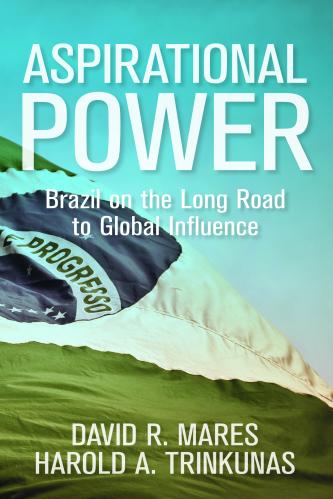
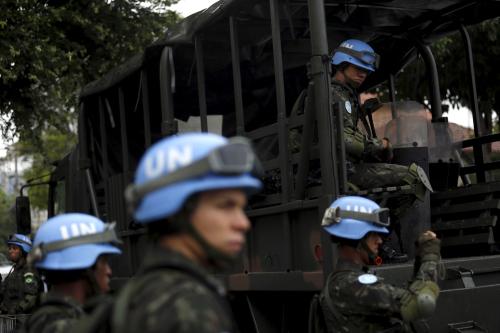
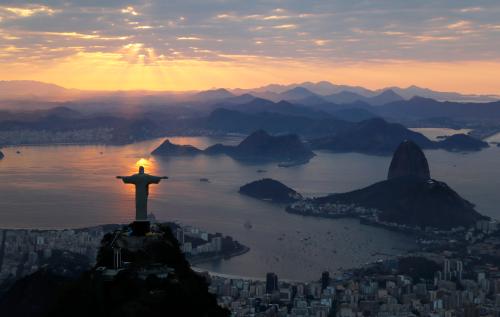

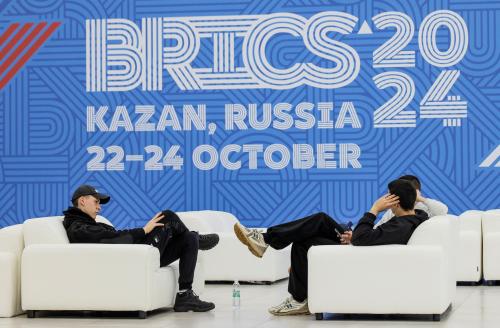
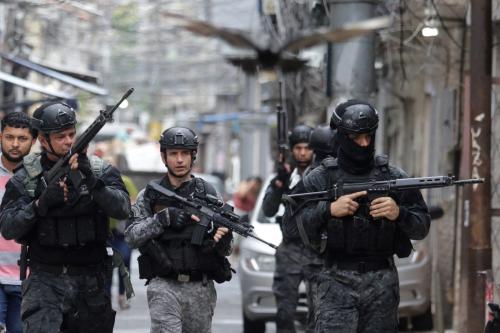
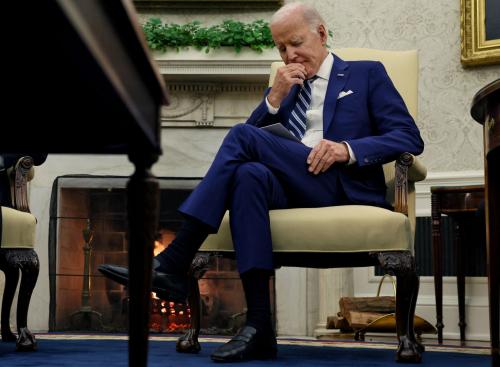
Commentary
Brazil’s new president: strongman at home, weak man abroad?
October 31, 2018